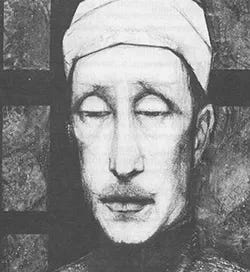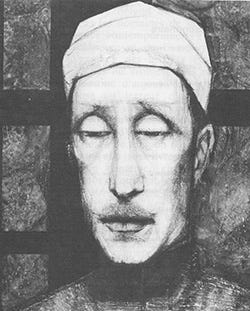King Charles III, Traditionalism and René Guénon.
Stephen Watt argues that Traditionalism from a non-Catholic origin has much to teach the Scottish Catholic Church in helping us seek and then become Truth, not just understand it.
Although we have only just started the new King’s reign, speculation about what sort of monarch Charles will be has already begun. One element in this speculation concerns King Charles’s previous championing of the course of tradition against modernity, particularly in the field of architecture.
In this article, I’m going to concentrate on one particular understanding of tradition embodied in the Traditionalist School of the French thinker, René Guénon (1886-1951). There’s no doubt that King Charles is familiar with this particular understanding (Millar 2016; Oborne and Mulla 2022) but it is unclear how strong this influence is. In any case, quite apart from any specific connection with Guénon’s version of Traditionalism King Charles may have, that version has certainly influenced a number of other key political and cultural figures and is therefore worth examining in its own right.
One of the greatest blocks in analysing Traditionalism is the confusion of terms in this area. For example, the Traditionalism attributed to Guénon has almost nothing directly to do with Catholic Traditionalism. Rather than attempting to trace the various paths through this complexity, I’m going to cut the Gordian Knot and stipulate that, from now on, unless made explicit otherwise, when I talk of Traditionalism in this article, I mean the following approach:
1) the defining figures are René Guénon, Frithjof Schuon (1907-98) and Ananda Coomaraswamy (1877-1947);
2) although there are many exoteric traditions, underlying them all is a shared esoteric metaphysics;
3) that esoteric metaphysics is accessed by a vision of the pure Intellect, rather than by philosophical argument and reason.
Together with those three central points, there are a number of other important tendencies which should be noted and which are focused on to a greater or lesser extent depending on the particular writing or writer in question:
a) the ‘metaphysics’ in question is generally better articulated through Indian philosophy rather than through the West;
b) access to that metaphysics requires a transformation of the knower, not just a conceptual understanding of a system of philosophy;
c) accordingly, a system of initiation is required which prepares the initiate to access the vision of metaphysical Truth. For a variety of reasons, this initiation is often more easily available to Westerners through the practices of Islam and, in particular, Sufism, rather than through other traditions;
d) although all valid traditions share an underlying esoteric metaphysics, it is normally important to practise one exoteric path rather to mix religions eclectically.
Much of that may remain obscure to a reader unfamiliar with Traditionalist writings, and perhaps still obscure even to many who are familiar with them. But some clear points can be brought out. Firstly, previous ages, had a grasp of Truth which particularly in the West, we have lost. Secondly, that access to Truth can be restored, but it requires special individuals armed with insights from outside Western modernity (particularly Hinduism as far as articulation and Sufism as far as practice) to bring about that restoration. Secondly, Traditionalism treads a fine line between claiming that all religious traditions are valid paths to Truth, and asserting the importance of avoiding indifferentism between different religions: although the underlying metaphysical Truth is one for all religions, that one Truth must be approached by holding fast to a particular Tradition.
What then is a Catholic, particularly a Scottish Catholic to make of all this? A natural reaction might simply be to reject it out of hand. There’s enough on the surface about esoteric knowledge, borrowing from other religions and initiation into non-Catholic groups quite reasonably to sound alarm bells. On the other hand, Traditionalism has brought some people to Christianity. An example of this is Father Seraphim Rose, the Russian Orthodox convert, who said:
It was René Guénon who taught me to seek and love the Truth above all else, and to be unsatisfied with anything else; this is what finally brought me to the Orthodox Church…I look back fondly now on René Guénon as my first real instructor in Truth, and I only pray that you will take what is good from him and not let his limitations chain you.
Quite apart from this full conversion to Christianity, Traditionalism seems likely to have been an element of King Charles’s continued practice of Anglicanism, and certainly would provide a motive for Christianity as an exoteric practice.
In one of my earlier articles:
I wrote about Charles Taylor’s concept of the buffered self: in our modern secular age, individuals peer into the world through this buffer, before choosing to allow certain values and beliefs through that barrier into our selves. Traditionalism can help us in modernity in at least two ways. Firstly, by presenting key beliefs in a way that is not simply dependent on Catholic teaching, it can make them easier to accept for a secularised mind. (And all our minds are, to some extent, secularised in the modern West. However deep our commitment to Catholicism, all -or at least almost all- of us have been long stewed in modernity: Traditionalism is, in part, a very modern way into tradition.) Scottish public culture at the moment seems particularly prey to a progressivism where the mere statement that something is not up to date is supposed to be an unanswerable criticism. Traditionalism by its positive re-evaluation of past practices and beliefs can be helpful in at least slowing down this rhetorical move. Secondly, in its emphasis on interiority in the form of esotericism, it can correct not just secular culture but also some tendencies within the Western Catholic Church. Modern Scottish Catholicism can be very good at sustaining communities where the practice of the faith has become part of the fabric of life with a round of Catholic school, First Communions, marriage and baptism. But it can also be very bad at acknowledging and supporting the interior life that makes this exoteric practice valuable and attractive. It is noticeable that many exponents of Traditionalism have emphasised Eastern Orthodoxy rather than Western Catholicism as a possible destination for the Traditionalist precisely on these grounds: Western Christianity, whether Catholic or Protestant, has abandoned the development of the person which allows the initiate more to become Truth than simply to understand it. Some of this charge is bunkum (the Catholic Church hasn’t lost such practices) and some reflects rather poorly on Eastern Orthodoxy rather than Catholicism (where some Orthodox seem to have ignored Father Seraphim’s warnings and have been chained by Guénon’s limitations). That said, at its worst, Scottish Catholicism can seem little more than an arid secular philanthropy rather than the lighting of an internal, sacred fire. Traditionalism, by offering an external perspective on Catholicism, particularly in its understanding of art and the symbolic, can provide a fresh insight into what has been overlooked and what might be reclaimed in pursuit of the sacred.
To sum up, Traditionalism in the sense addressed in this article is both a living influence on our world (including King Charles III) and a perspective that offers the chance for Catholics and non-Catholic religious seekers to deepen their lives. Not all its insights are correct and some are positively harmful. But that is a common position in modernity where each of us, condemned to wade amphibiously between the secular and the sacred, has to pick carefully what we will allow inside the buffers of the self.
Stephen Watt
References:





What a great, clear statement of Traditionalism. The line that really stood out to me was "Traditionalism is, in part, a very modern way into tradition." Evola says somewhere that his views of politics are simply what a normal and decent person would have thought in the past. But I think modern Traditionalists do a poor job of taking the moral high ground of decency when they present their views. So I really like this idea that the modern appeal of Traditionalism might help to make it a kind of progressive cause, progress toward a better past.
This is an excellent example of how to talk about traditionalism and--more generally--weighty somewhat philosophical topics. I have seen many internet arguments degrade because each party has an imprecise understanding of what the other party means, and so both sides argue against straw men they built themselves. Your meticulous and careful articulation of tradition was interesting and useful to me, and I am increasingly intrigued by the close tie-in to The Scottish cultural spirit. Thank you for this!